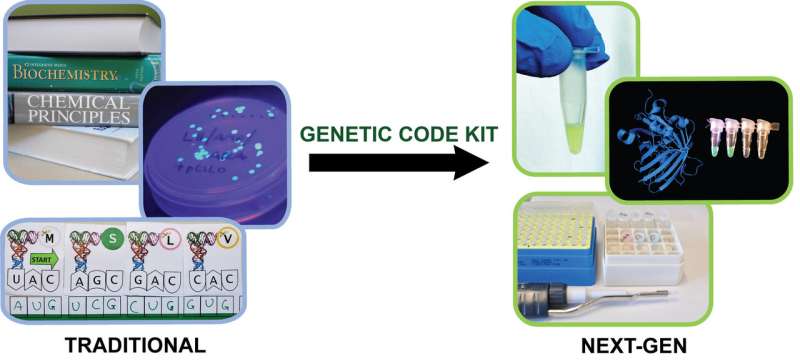Unlocking the cell enhances student learning of the genetic code

An open-source educational biotechnology called the "Genetic Code Kit" has been developed by California Polytechnic State University researchers to allow students to interact with the molecular process inside cells in new ways. Researchers show that adapting state-of-the-art biotechnology for the classroom could transform how biology and biochemistry are taught to high school and undergraduate students.
Often referred to as the "central dogma" of biology, the process by which genetic information is used to create proteins is a notoriously difficult topic to teach. While it is critical to students' understanding of life at the molecular level, it is also one of the first "invisible" processes in biology that students are required to learn. Not only are these processes hard to visualize, but they are also trapped inside of the cell. For students, the cell represents a black-box, limiting direct access to biochemical machinery that would be required for active, inquiry-based learning. As a result, instructors are limited to using laboratory experiments with living cells or model- and analogy-based activities to teach these topics, but evidence suggests that these methods are not fully effective for students' learning outcomes.
Reported in the journal Frontiers in Bioengineering and Biotechnology, researchers have harnessed the cell's genetic code in a test tube to create a kit capable of supporting a variety of learning objectives in the classroom. The cell-free protein synthesis (CFPS) biotechnology allows researchers, and now instructors and students, to isolate and manipulate the important, protein-making machinery of cells, without requiring the cells to be alive. This makes CFPS an accessible and open system because the processes of transcription and translation are no longer constrained within the black box of the cell.
These advantages of CFPS inspired professors Javin Oza and Katharine Watts to bring cell-free techniques into biochemistry classrooms at Cal Poly with a goal of achieving greater student understanding of the genetic code. Toward this end, a team of undergraduate student researchers developed a classroom kit containing an inexpensive, modular CFPS reaction that is easy to use for novice scientists and can help teach transcription and translation in a Learn by Doing fashion. Students can now generate a hypothesis and test it by directly manipulating the biochemical machinery and learn in a hands-on, inquiry-based manner. The Genetic Code Kit is accompanied by an augmented reality activity that allows students to explore structure-function relationships in green fluorescent protein.
In addition to developing the Genetic Code Kit, the research team was the first to evaluate the impact this educational biotechnology can have on student learning. In a study of 60 students in a Survey of Biochemistry course, the team found that the Genetic Code Kit significantly improved student learning gains on transcription and translation content. They also identified increases in student comfort and confidence with common biotechnology lab techniques, which indicates that this activity helps prepare students to pursue graduate programs and careers in the biotechnology workforce.
CFPS is poised to transform the way biochemistry and molecular biology are taught. Educators are able to purchase a variety of commercial kits, and the Genetic Code Kit now provides an open-source, modular kit for instructors to support inquiry-based learning in their classrooms.
Researchers at Cal Poly will continue to develop the Genetic Code Kit to address the many gaps that remain in biochemistry and molecular biology education. In addition to addressing a variety of learning objectives, the Genetic Code Kit will help high school teachers better meet the Next Generation Science Standards, and allow college-level instructors to integrate course-based undergraduate research experiences. Continued assessment efforts will evaluate whether educational biotechnologies such as the Genetic Code Kit are able to help narrow the achievement gaps in science, technology, engineering and math (STEM).
More information: Layne C. Williams et al, The Genetic Code Kit: An Open-Source Cell-Free Platform for Biochemical and Biotechnology Education, Frontiers in Bioengineering and Biotechnology (2020). DOI: 10.3389/fbioe.2020.00941
Provided by California Polytechnic State University



















